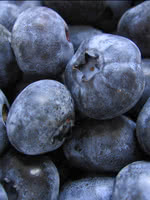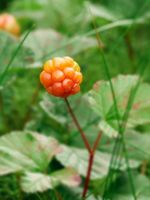Mon-Fri 9am - 5pm Mountain time
Northblue Blueberry vs Cloudberry
Vaccinium corymbosum Northblue
Rubus chamaemorus
NOT AVAILABLE THIS SEASON - MIGHT RETURN
NOT AVAILABLE THIS SEASON - MIGHT RETURN
Northblue Blueberry produces the best tasting of the half-high blueberries we carry. It's a cross between a highbush and a lowbush variety, which makes it suitable for smaller yards. For its size, Northblue Blueberry produces abundant quantities of large, firm berries. They are sweet and juicy.
While this variety is self-pollinating, we recommend pairing it with another suitable blueberry to increase the berry production of both varieties.
Note: Blueberries require very specific soil conditions. They need well-drained soil with a pH between 4.5 and 5.0. If the starting pH of your soil is between 5.1 and 6.2 you can lower it by adding sulfur. We recommend against planting blueberries in soil with a starting pH greater than 6.2. Please do your own research before buying any blueberry plants.
Cloudberry produces berries which taste tart and tangy with a sweet, floral hint. The berries have a creamy texture when overripe. They are often used to make jams, juices, and liquors. The berries are a pale red colour and when ripe turn more orange/amber. They do not grow very tall, generally reaching only 10-25 cm.
Cloudberry has distinct male and female plants. In order to produce berries, both must be present and pollinate with each other. Berries are produced at maturity, typically 5-7 years, and produce 1 berry per stem. The plant spreads naturally as they grow using modified underground stems (rhizomes), forming more plants over time in the same area.
This plant can be found wild in Canada’s boreal forest. In Newfoundland and Labrador, this plant is known as the Bakeapple and is a significant regional food. Similarly the Côte-Nord region of Quebec also has a long history of using this berry.
Note: Cloudberries require very specific soil conditions. They need well-drained soil with a pH between 3.5 and 5.0. Also sensitive to salt and dry conditions.
Note: Our seedlings are grown from seed and are too young to identify their sex.

